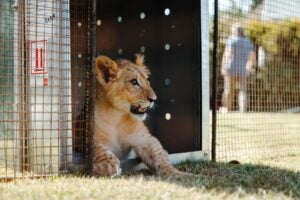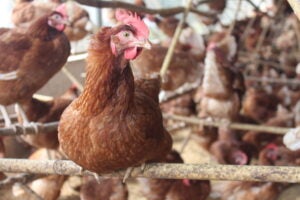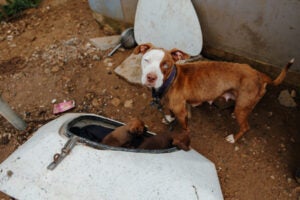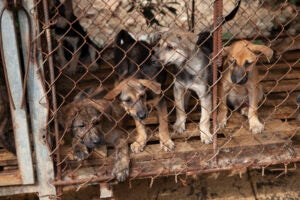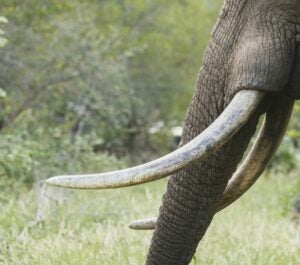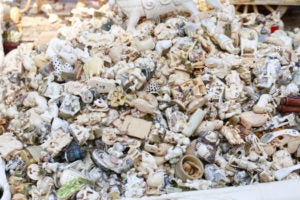
THAI NGUYEN , Viet Nam—More than 50 puppies have been rescued from two dog meat fattening farms in Thai Nguyen as part of a joint effort between the local government and animal charity Humane Society International to crack down on the dog meat trade in one of Viet Nam’s dog meat hotspots. The owners of the two facilities, where puppies were bought from local villages and fattened up for weeks to reach slaughter weight, plan to transition to new sustainable livelihoods, one an agricultural supply store and the other a crop smallholding.
Download video and images of the rescue..
These are the fourth and fifth dog or cat meat trade businesses to close under HSI’s Models for Change program, coming less than three months after Prime Minister Pham Minh Chinh signed a directive instructing local authorities to strictly implement rabies prevention and control. The link between the dog meat trade and the spread of deadly rabies has been well established by the World Health Organization and others. The trade undermines rabies elimination efforts because it removes vaccinated dogs who are stolen for the meat trade from local communities, effectively removing the barrier to stopping the spread of rabies. This is a compelling driver to end the trade, as is the suffering and killing of 5 million dogs and 1 million cats a year for meat in Viet Nam.
HSI has a three-year agreement with the governments in Dong Nai and Thai Nguyen to transition businesses away from the dog and cat meat trades, implement rabies vaccination and humane dog population management programs as well as promote public awareness campaigns to discourage dog and cat meat consumption. HSI will also work with law enforcement agencies to crack down on dog and cat trafficking activities.
Fifty-two-year old Mr Phạm Dũng ran his puppy fattening farm for seven years before contacting HSI’s Viet Nam team to begin the process of closing up. Supplying puppies to local dog meat restaurants and slaughterhouses for so long has taken its toll on him and he feels deep remorse at the lives he has sent to slaughter.
Mr Dũng told HSI: “I’m looking forward to putting the dog meat trade behind me and growing crops instead. Harvesting beansprouts and sweet potatoes will be a lot more peaceful than fattening puppies for slaughter, and a lot better for my mental health knowing I’m not causing any suffering. It’s also a healthier lifestyle with no links to rabies, so my family and I are happy about this.”
Thirty-five-year old Mr Trần Lê Hậu plans to open an agricultural supply store in his local community supplying seeds and fertilizer for crop cultivation.
“When I first launched this business three years ago, I hoped it would be profitable, but I no longer want to be involved in the dog meat trade,” he said. “I know about the dangers of rabies and other diseases, and I don’t want that for my family or my community.”
Most dogs killed for meat in Viet Nam are stolen pets or strays snatched from the streets using poison bait, painful taser guns, pincers or ropes. Others are smuggled in on trucks and buses from surrounding countries such as Cambodia. Puppy fattening farms, which rely on traders going village to village on motorbikes to exchange puppies for cooking pots or cash, represent a smaller part of the trade but in dog meat hotspots like Thai Nguyen the farms are far more common. The puppies are crammed together in small cages and driven for hours to facilities like those run by Mr Dũng and Mr Hậu for fattening up, many enduring dehydration, suffocation, heatstroke and even death on the journey.
Quang Nguyen, HSI’s Viet Nam companion animals and engagement program manager, said: “The dog meat trade in Viet Nam is not only an animal welfare disaster but also incompatible with canine rabies elimination efforts. The mass, unregulated production and movement of puppies and dogs to supply fattening farms, restaurants and slaughterhouses contravenes internationally recognized guidelines issued by human and animal health experts on how to control and ultimately eliminate rabies.”
Dr Katherine Polak, HSI’s vice president of companion animals and engagement, said: “HSI is working towards ending the trade nationwide so projects like our Models for Change program, in tandem with dog vaccination, law enforcement and public awareness campaigns, are vital to crack down on this cruel and dangerous business. For the more than 50 puppies we’ve rescued from these two facilities, it’s been a lucky escape from the brutal dog meat trade and we look forward to seeing them start their journeys to find loving homes.”
Recent HSI research in Viet Nam has shone a spotlight on the vast network of dog thieves, traffickers and traders who operate across the country. In January this year, investigators observed dogs being brutally treated in holding centres in Thanh Hoa province where they were jabbed with metal poles, dragged by the neck with tongs and crammed into cages in the sweltering heat to be transported for slaughter. The investigators filmed truckloads of dogs, each carrying up to 500 animals, being taken on the highways on journeys lasting many hours without water, food or rest.
The HSI Models for Change project was attended by representatives from Thai Nguyen and Dong Nai provincial Department of Animal Health as well as the central government’s Department of Livestock Production and the Vice Minister of the Ministry of Agriculture and Rural Development.
Mr Vinh Le Dac, director of Thai Nguyen Animal Husbandry, Veterinary and Fisheries Sub-department, said: “Rabies is a common disease in Viet Nam and the dog meat trade is a cause contributing to the spread of the virus. Therefore, we are very pleased to collaborate with HSI in Viet Nam in the Models for Change program to contribute to promoting companion animal welfare and eliminating rabies in the province. Models for Change contributes to helping dog and cat meat restaurant, slaughterhouse and farm owners transition to better and safer livelihoods for themselves and the community.”
The more than 50 puppies rescued from the two fattening farms have been transported to custom-made sheltering at Thai Nguyen University of Agriculture and Forestry where they will be vaccinated against rabies and receive medical care and rehabilitation before being made available for local adoption.
Dog meat fact:
- HSI originally launched Models for Change in South Korea as part of a strategy to demonstrate to the government that a phase out of the dog meat industry there was achievable in cooperation instead of in conflict with dog farmers. Having played an instrumental role in creating the political momentum that ultimately led to a legislative ban in South Korea, HSI launched Models for Change in Viet Nam in 2022.
- Most people in Viet Nam don’t eat dog meat. An Aug./Sept. 2023 Nielsen opinion poll commissioned by HSI found that around one quarter of the population (24%) had consumed dog meat (thịt chó) in the last year, with 64% and 68% of respondents respectively supporting a ban on dog meat consumption and trade. A belief by some consumers persists—despite no scientific evidence—that dog meat has medicinal properties and can increase male virility.
- HSI research shows that dog meat is not an expensive delicacy, costing from 150,000 – 200,000 VND ($6 – $8) per dish in Thai Nguyen.
- Data from Viet Nam’s National Institute of Hygiene and Epidemiology shows that a significant proportion of rabies patients become infected with the virus after killing, butchering or eating dogs, as well as from bites. Studies of brain samples of dogs collected from slaughterhouses in northern and southern provinces have also tested positive for the rabies virus.
Download video and photos of HSI closing down the puppy fattening farms
Download video and photos of Viet Nam’s dog and cat meat trade
ENDS
Media contacts:
- HSI Global: Wendy Higgins, director of international media; whiggins@hsi.org
- HSI in Việt Nam: Thẩm Phượng, country director; phuongth@hsi.org
The Nielsen survey was conducted online in August and September 2023, targeting 800 respondents aged 25 to 60, considering gender, age and regional demographics, with margin of error +-2.53%.



